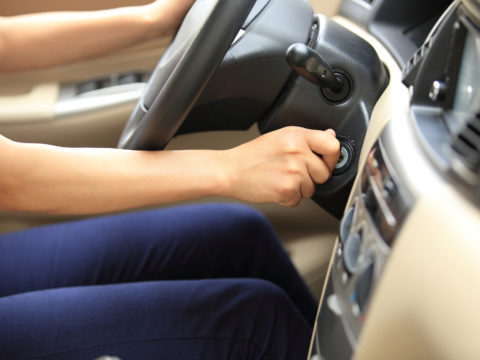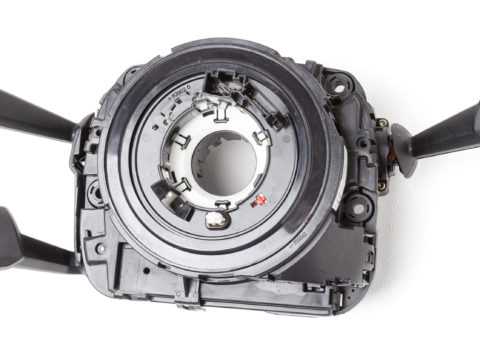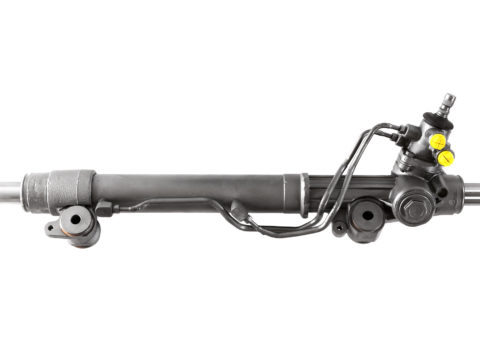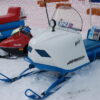If you’ve ever turned your car’s steering wheel while stationary and heard a strange noise, it may mean that there is something seriously wrong. The problem can include faulty power steering racks, worn-out struts and shocks, fluid leaks, and several other things you’ll want to check.
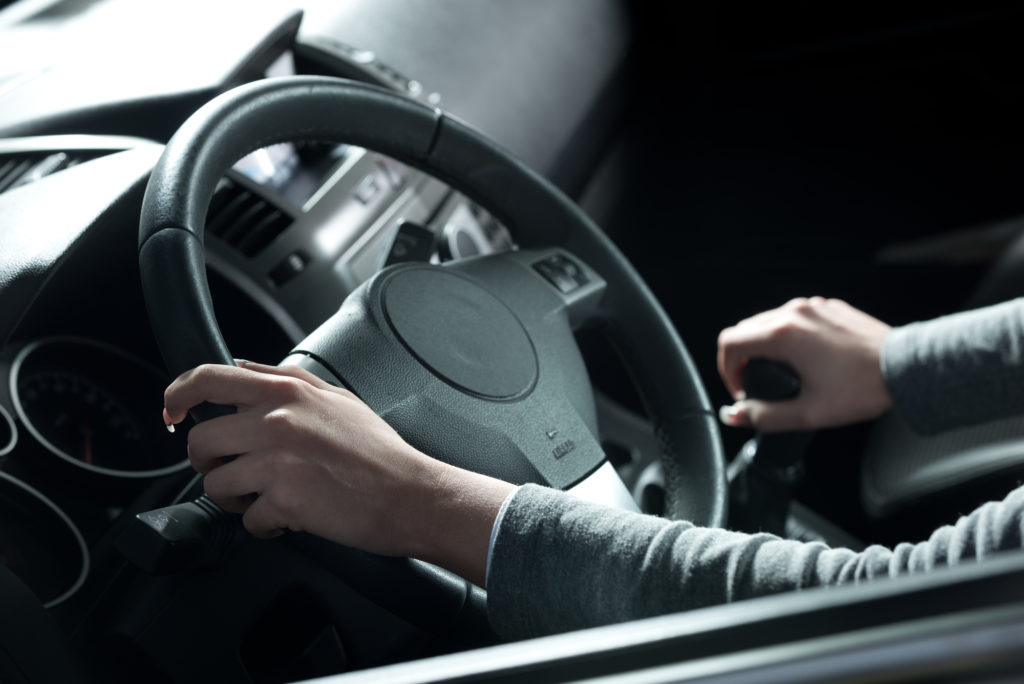
Contents
Intro
When your steering wheel starts making strange noises, determining the cause can require multiple steps. However, not all the noises that your steering wheel makes indicate an issue or problem.
For example, when it gets cold in the winter, the wheel can get stiff if the car does not receive use for an extended time. In that case, when you go to use it, it may make creaking and groaning sounds due to that stiffness, but the sounds aren’t a surefire sign of damage to the steering wheel.
To determine if your steering wheel is making noises because of damages, you will first need to know how to differentiate between the normal sounds steering wheels make and the ones that only happen when there is damage. Since learning the meanings of the different sounds and situations is not easy, let’s cover some of them in detail below.
Scenarios That May Cause Steering Wheel Noises
Here are two scenarios that steering wheel noises can result from and explanations for each.
I) Steering Wheel Noises Indicating A Fault
Cause 1: Whining In Sharp Turns
If you make a sharp turn and hear a whining noise coming from your steering wheel, it means that something is wrong with your car’s steering system. Usually, this will happen regardless of which way you turn the wheel. However, in some cases, the whining may only occur if you turn the wheel a specific amount in a particular direction.
Regardless of what type of turning triggers the sounds, you can safely assume that the noises are a product of issues with the steering knuckle, control arms, and ball joints. These parts commonly wear out over time, so problems with them tend to creep up on you if you aren’t the kind of person who frequently checks them.
Cause 2: Squeaking From Bad Struts
Struts are a part of your car that plays a significant role in ensuring your vehicle’s stability maintains itself whenever movement is happening. So, when you turn, brake, accelerate, or do anything that puts your car into motion, your struts help keep everything nice and even.
In the front strut, there is something called jounce bushing, and this device is part of what allows struts to do their job correctly. Because jounce bushings need lubrication, they become counterintuitive when dry, which can lead to a squeaking sound when you turn the wheel. It’s best to tend to this issue as soon as possible, as the squeaking will only worsen over time.
Cause 3: Grinding From Damaged Steering Column Bearing
Steering column bearings are another part of your car that helps maintain stability, just like struts. Specifically, these bearings make it so that your steering wheel can carry out smooth turns without becoming bound. You probably don’t notice the effect of these bearings when they are working, but you will immediately notice them if they start malfunctioning because of the sound.
Suppose steering column bearings become too old or damaged. In that case, your steering wheel will start making noise when it turns because the wheel’s plastic and the cowling on the controlling section of the steering column rub against one another.
Cause 4: Loud Noises on Sharp and Normal Turns Due To Low Lubrication on The Power Steering System
The power steering system makes it easier to control a car at lower speeds by reducing the necessary exertion to turn the front wheels. Without it, maneuvering around at slow speeds would be a more difficult task, especially for precise maneuvers.
To keep things functioning properly, fluid goes into the filter chamber of a reservoir and keeps dirt and debris out of the power steering system. However, if the reservoir suffers from a clog, you’ll start to hear noises when you turn your steering wheel, regardless of whether you do sharp or slow turns.
Cause 5: Squeaking Sound When Turning at High or Low Speeds From Bad Ball Joints
If your steering wheel emits a high-pitched squeaking sound when turning at high or low speeds, it could mean that your car has damaged ball joints. Similar to the steering column bearings and struts, the ball joints also affect how your vehicle performs from a stability perspective.
Without the proper amount of lubrication from oil, the ball joints will dry to the point where a squeaking sound will regularly start coming from your vehicle’s steering wheel when you turn. Thankfully, it is easy enough to prevent this from happening if you periodically check the ball joints to ensure they are not getting dry from a lack of oil.
Cause 6: Noises When Turning Because of Leaking Power Steering Fluid
While one of the more unlikely occurrences on this list, leaking power steering fluid can cause your steering wheel to make noise when turning. Aside from the sound, your wheel will make when you turn it, the easiest way to detect this type of leak is to look underneath your vehicle and see if there are any oily spots on the ground.
If you see no spots but still suspect that your vehicle is leaking fluid, turn the steering wheel and pay attention to how it handles. If the steering is tough and jerky, that is another telltale sign that something is not working correctly in the power steering system.
Cause 7: Clicking Noise From a Bad Clock Spring
Lastly, you might hear a clicking noise come from behind your steering wheel when you turn it. This generally happens when the clock spring in your vehicle goes bad. In a nutshell, the clock spring connects the steering wheel to the airbag, horn, and the vehicle’s other electrical systems.
If the spring breaks or gets stuck, you will start to hear the clicking sound every time you make a turn with the steering wheel. In this case, your best bet is to have a certified mechanic tend to the issue and replace the spring.

II) Normal Steering Wheel Noises
Now that we’ve gone over the steering wheel noises that indicate a faulty steering wheel let’s also go over a few noises that are not always cause for serious alarm.
Locking Steering Wheel
If your steering wheel goes off with a click, this is not necessarily a bad thing. Steering wheel locks are different from one vehicle to the next, but in most cases, the noise you hear is likely coming from a plate cover hitting the steering wheel as it turns or something else that relates to that area.
Turning The Steering Wheel With The Blinker On
When you have your blinker on and turn your steering wheel, you should hear a clicking sound when the steering wheel rotates back to its original position at the center. The clicking sound you will hear comes from a cam in the turn signal that clicks every time it goes past the turn signal’s spring arm.
What To Do When Your Steering Wheel Makes Noises
So, aside from the normal noises, your wheel should make, what should you do when your wheel starts making random grinding, clunking, squeaking, scratching, popping, creaking, groaning, squealing, and other similar sounds?
We discussed a few courses of action above, but most of the time, you should consult the expertise of a certified mechanic that you trust.
Yes, you can fix all of these things on your own if you know enough about cars and can acquire the right parts. However, because every car is different, you need to know what you are doing if you plan on trying any DIY fixes for your steering wheel troubles. And more often than not, the fixes you will have to do won’t be easy by any means.
Seeking out help from a professional is the safer choice, as the last thing you want is to attempt to fix an issue yourself, only to accidentally make it worse in some way.
Because of this, if your steering wheel starts making noises and acting out of sorts, use the information we went over above to try and identify the cause of the sounds. That way, when you do go to a professional, you will at the very least be able to inform them about what you think is wrong with your vehicle’s steering wheel.
In the case where you cannot identify the cause of the sounds on your own, it is still best to take your vehicle to a professional since they will more than likely figure out what is wrong regardless and tell you what course of action you should take to fix it.
If you follow all the points above, you will have nothing to fear if or when you have problems with your steering wheel. Just remember to test for each potential cause individually, rule out one before going onto the next, and consult a professional once you reach your wits end!


